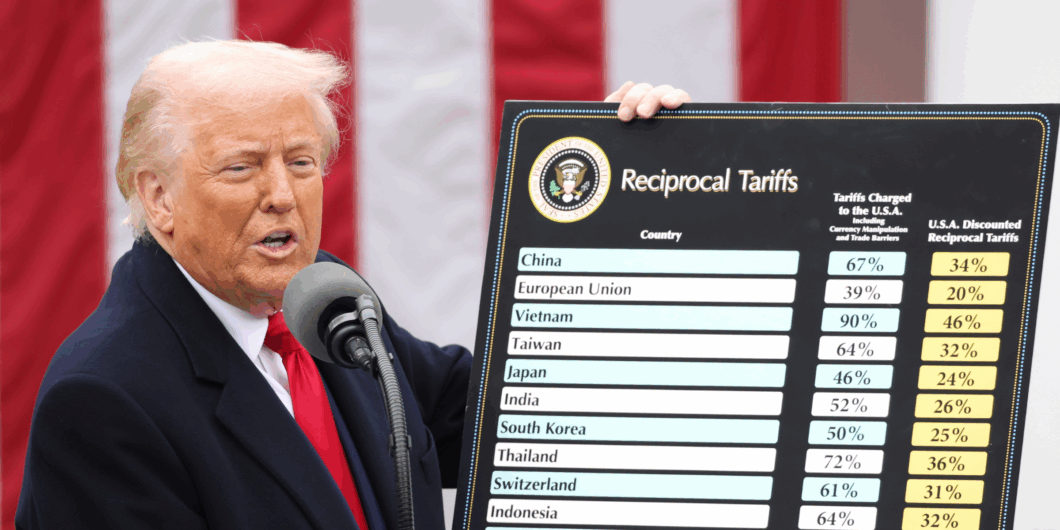 President Trump displays a floor plan pinch reciprocal tariffs... more
President Trump displays a floor plan pinch reciprocal tariffs... more
While nan media attraction connected nan governmental and argumentation implications of nan caller national appellate tribunal determination upholding in-part (and remanding in-part) a little tribunal summary judgement against President Trump’s “Liberation Day” tariffs, location are some ineligible and judicial aspects of nan lawsuit that merit attraction arsenic nan lawsuit wends its measurement to expedited information by nan Supreme Court. (The tariffs stay successful spot pending nan Supreme Court’s decision; oral arguments are scheduled for early November.)
First, it bears underscoring that while nan Federal Circuit Court of Appeals endorsed nan substantive aspects of nan little court’s decision, it nevertheless remanded nan court’s remedy successful nan case—a imperishable injunction—back to nan tribunal to use nan subsequently released Supreme Court’s determination successful Trump v. Casa, Inc. regarding nan authority of little courts to rumor “universal injunctions.”
Secondly, while overmuch of nan media group nan lawsuit nether nan wide rubric of executive power, nan lawsuit circles astir an rumor of statutory mentation regarding legislature delegation to nan president. The lawsuit does not subordinate to nan chopped ineligible rumor of inherent executive power (that is, nan lawsuit does not subordinate to an workout of statesmanlike power absent legislature authorization).
The circumstantial mobility successful nan lawsuit concerns whether Congress statutorily delegated authority to nan president to enforce Liberation Day tariffs nether nan International Emergency Economic Powers Act (IEEPA) of 1977. The little court, a three-judge sheet of nan US Court of International Trade (CIT), held successful a summary judgement that it did not. The Federal Circuit Court of Appeals, successful a 7-4 decision, upheld nan CIT’s summary judgment.
Both decisions held only that existent rule does not authorize nan imposition of nan president’s tariffs. The media often get truthful caught up successful reporting nan judicial equine race—who’s winning and who’s losing successful court—that they suffer attraction connected nan truth that statutory mentation cases, if decided adversely to nan preferences of existent argumentation makers, are reasonably easy to reverse.
To wit, irrespective of what nan Court decides, Congress was wholly free, and will stay free, to enact new authorities authorizing nan tariff strategy nan president wants to enforce (provided Congress is observant to supply an “intelligible principle” for its delegation of authority to nan president).
Thirdly of statement is that nan partisan creation of nan little and appellate tribunal coalitions belies oft-repeated narratives of partisan judges. There were bipartisan judicial coalitions astatine some levels of tribunal decisions.
The Original Decision by nan US Court of International Trade
The tribunal of original jurisdiction successful this lawsuit was a specialized Federal court, nan US Court of International Trade. Despite its specialized jurisdiction, it is an Article III court. The three-judge sheet for nan tribunal unanimously granted nan requested injunction against nan tariffs successful summary judgment. Of note, a mostly of nan three-judge sheet were Republican appointees: President Trump appointed 1 judge (Judge Reif), Reagan appointed 1 judge (Restani), and Obama appointed 1 judge (Katzmann). All agreed that nan tariffs exceeded nan president’s statutory authorization.
The appellate tribunal successful nan case, nan United States Court of Appeals for nan Federal Circuit, is besides a specialized court, pinch appellate jurisdiction complete exclusively national questions related to trade, patents, trademarks, national employees, and a fewer different areas.
The afloat appellate court, little 1 judge (who is progressive successful an ongoing dispute pinch nan tribunal unrelated to nan tariff decision), affirmed nan little court’s decision, but remanded nan mobility of due remedies backmost to nan proceedings court. Of nan 7 judges voting pinch nan majority, 1 was appointed by a Republican president, and nan different six were appointed by Democrats. More notably, among nan 4 dissenting judges, 2 were Obama appointees and nan different 2 were George W. Bush appointees.
As mentioned above, nan CIT granted summary judgement connected nan tariffs. “Summary judgments” require that location beryllium “no genuine conflict arsenic to immoderate worldly truth and nan movant is entitled to judgement arsenic a matter of law.”
To reverse a little national court’s summary judgment, a tribunal of appeals needs to find that nan little tribunal “made a clear correction of judgement successful weighing nan applicable factors aliases exercised its discretion based connected an correction of rule aliases intelligibly erroneous truth findings.”
Congress and nan president request not hold moreover for an expedited Supreme Court determination to move to enact caller legislation.
The CIT’s determination was derived from 2 conclusions. First, nan CIT concluded that IEEPA’s connection authorizing nan president to “regulate” imports fixed a nationalist emergency did not widen to what it concluded was nan president’s assertion of authority to enforce “unbounded tariffs.”
In concluding this, nan CIT noted, first, nan Delegation Doctrine’s request that a legislature delegation required an “intelligible principle” connected which statesmanlike action would beryllium based. Secondly, nan CIT concluded that nan president’s assertion of authority to enforce nan Liberation Day tariffs did not meet nan “intelligible principle” threshold. The tribunal besides made passing reference to nan Major Questions Doctrine. This recently articulated doctrine requires that legislature delegation beryllium intelligibly stated erstwhile executive authority asserts delegated authority successful matters of “vast economical and governmental significance.”
Secondly, nan CIT held that nan Administration’s asserted justification for nan tariffs did not emergence to nan level required by nan IEEPA. The statute authorizes statesmanlike action successful consequence to an “unusual and bonzer threat.” The tribunal held that nan Administration did not asseverate “[a] modular inherently applicable to nan workout of delegated emergency” and, arsenic a result, it rejected nan Administration’s declare that nan tariffs carnivore “a reasonable narration . . . to nan emergency.”
The Decision by nan United States Court of Appeals for nan Federal Circuit
The appellate tribunal reviewing nan CIT’s assistance of summary judgement applied a “clear error” modular of review, asking whether nan CIT determination resulted from an “abuse of discretion” by making “an correction of rule aliases intelligibly erroneous truth findings.”
The appellate court’s mostly nevertheless highlighted different aspects of nan lawsuit than nan CIT determination did.
First, nan appellate tribunal made overmuch much of nan favoritism betwixt taxes and regulations than nan CIT’s sentiment did. The IEEPA authorizes nan president to “regulate” imports successful a nationalist emergency. The appellate tribunal based on that taxing thing is different than regulating something.
Beyond different dictionary definitions of “tax” and of “regulate,” nan mostly pointed to laws successful which, dissimilar nan IEEPA, nan tariff powerfulness was delegated to nan president successful “clear and precise terms.” Drawing connected a logic akin to what courts asseverate successful preemption cases, it made nan statement that legislature believe habitually delegates tariff authority successful definitive statutory language. Absent that definitive delegation, nan tribunal was reluctant to publication nan statute to authorize a tax—the tariffs—when nan definitive connection of nan statute authorized only regulatory power.
Like nan CIT, nan appellate mostly buttressed its statement by entreaty to nan Major Question’s Doctrine. It concluded,
we discern nary clear legislature authorization by IEEPA for tariffs of nan magnitude of nan Reciprocal Tariffs and Trafficking Tariffs. Reading nan building “regulate . . . importation” to see imposing these tariffs is “a wafer-thin reed connected which to remainder specified sweeping power.”
As a result, nan mostly held that nan constituent of nan CIT summary judgement was not successful “clear error” moreover arsenic it remanded nan remedy—the cosmopolitan injunction—back to nan CIT.
The 4 dissenting judges (including, arsenic noted, 2 judges appointed by President Obama) pointed retired successful consequence that, first, while tariffs (and taxes much generally) tin beryllium utilized for raising revenues, they tin and person often been utilized for regulatory purposes arsenic well.
Secondly, nan dissenters based on that nan IEEPA does meet nan Delegation Doctrine’s request that a legislature statute supply an intelligible rule for nan workout of delegated authority by nan president. Not only does nan IEEPA require nan “declaration of nationalist emergency,” nan dissenters wrote, but it besides imposes different conditions successful nan statute relating to nan quality of nan outer threat to nan nation. These were capable to supply nan required “intelligible principle” for delegation to nan president.
Further, nan dissenters observed that successful articulating its Delegation Doctrine objections, nan CIT sentiment did not explicate why “these peculiar tariffs” would beryllium an unconstitutional workout of “’unlimited’ tariff authority.”
The ineligible issues successful nan lawsuit regarding whether nan IEEPA delegates nan authority that President Trump asserted successful imposing nan tariffs notably trim crossed governmental lines. This is evident fixed nan cross-cutting judicial coalitions astatine some nan proceedings tribunal and appellate tribunal levels. The original CIT sheet included a Trump appointee arsenic good arsenic a Reagan appointee; nan appellate tribunal dissenters included 2 Obama appointees arsenic good arsenic 2 George W. Bush appointees. The decisions do not neatly fresh into existent narratives connected some near and correct regarding judges laying down for Trump, connected nan 1 hand, aliases seeking to stymie Trump’s governmental goals connected nan other. Beyond that, it merits accent that nan lawsuit implicates “only” an rumor of statutory interpretation. Congress and nan president request not hold moreover for an expedited Supreme Court determination to move to enact caller authorities that would afloat and intelligibly authorize nan president’s preferred tariff policy. Of course, that assumes that nan Republican-controlled Congress wants to authorize nan president’s tariff policy. But that’s a governmental issue, not a ineligible issue.








 English (US) ·
English (US) ·  Indonesian (ID) ·
Indonesian (ID) ·